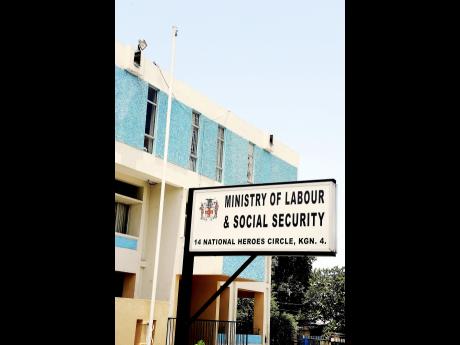Fattening the family - Ministry staff gives close relatives, friends $2m from money set aside to help the poorest Jamaicans
An accounting clerk in the Ministry of Labour and Social Security's Rehabilitation Programme Policy (RPP) gifted $1.7 million to her husband, mother, her three sisters, three brothers and a friend, in an unethical, if not illegal, raid of the fund established to provide emergency grants to the poorest of Jamaicans.
The accounting clerk was responsible for preparing the Payment Advice Listing at the Public Assistance Department at the ministry's office at National Heroes Circle in Kingston.
The clerk was also tasked with entering the payments on the accounting system and assisting in batching cheques for dispatch to the parishes.
But the clerk was not the only one who sought to line the pockets of family members with state resources as the administrator of the RRP also made 13 payments to his/her mother.
Lax system
That is part of a lax system with little or no accountability uncovered by the Auditor General's Department during a probe of the RPP late last year.
In a report tabled in Parliament last Thursday, Auditor General Pamela Monroe Ellis pointed to a system where millions have been paid out without proper checks and balances.
Monroe Ellis noted that personnel at the ministry made questionable payments to relatives and a friend of the two staff members amounting to $2 million between 2012 and 2017.
"These payments were made to 10 payees who were also the beneficiaries, and the education institution for a beneficiary," said Monroe Ellis.
The programme paid out some $800 million over the period reviewed by the Auditor General's Office.
Under the RPP, grants are provided to unemployed and underemployed persons in the categories of compassionate, emergency, education and social intervention and rehabilitation. In most cases, the money is to be paid to the suppliers of goods and services to those in need.
But Monroe Ellis noted that the ministry made 4,749 payments totalling $84.8 million to beneficiaries, instead of suppliers, as the rules dictate.
The only exception to this rule is the payment of emergency benefits, and Monroe Ellis found that of the almost $90 million disbursed only $7.5 million related to emergency grants.
"This heightened the risks of these grants not being used for the intended purposes," the auditor general cautioned.
Additionally, the audit found that of 7,640 payments totalling $166.7 million over the five-year period, 394 beneficiaries received two to three grants in the sum of $18 million.
"We also noted that 21 beneficiaries received in excess of three grants totalling $5 million over the period."
Another disturbing finding by Monroe Ellis was that the payment advices for the grants disbursed reflected a different address for the same beneficiary on all occasions.
However, each address recorded was consistent with the parish to which the payment advice related.
"Despite our requests, the grant application files were not presented, which would substantiate the due diligence carried out by the social worker and the approval at the parish committee.
"There was also no evidence that the cheques drawn for these grants were recorded in the dispatch logbook," noted Monroe Ellis.
The auditor general argued that Section 4.2.9 of the Staff Orders of 2004 states that a conflict of interest may be deemed to exist in exploiting the status and privilege of one's position for private gain or the ownership of investment or shares in any company or undertaking.
The Staff Orders further states that in order to address the potential for conflict of interest, officers should inform the appropriate authority of any such undertaking and get permission.
The ministry has been instructed to immediately implement the recommendations of a June 2011 Performance Audit Report which was done by the auditor general.
Monroe Ellis has also urged the ministry to conduct a comprehensive risk assessment of its social protection programmes, inclusive of the RPP, with the objective of introducing risk-management strategies to mitigate possible irregularities and fraud.
Further, the ministry has been ordered to cease payments in beneficiaries' names, execute the appropriate due diligence before the disbursement of grants, and carry out monitoring and evaluation of all projects in adherence to its own RPP procedures.
The ministry has also been advised to undertake continuous data matching within its benefits programmes, as well as with other government entities such as the Registrar General's Department and Tax Administration Jamaica, to assist in the detection of irregularities.


